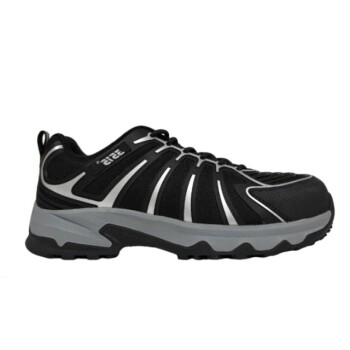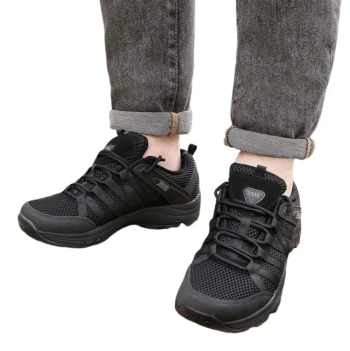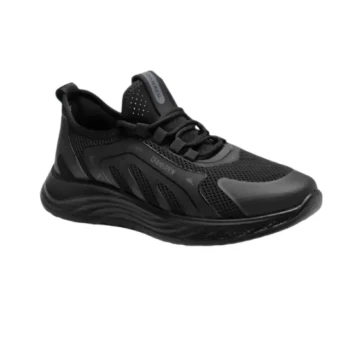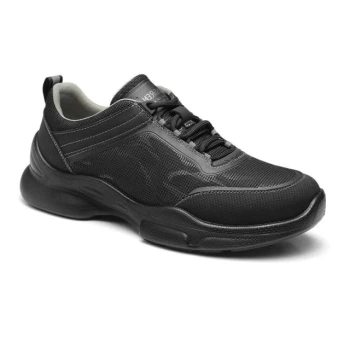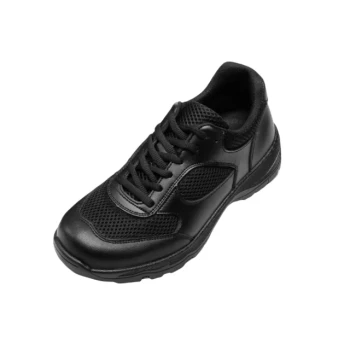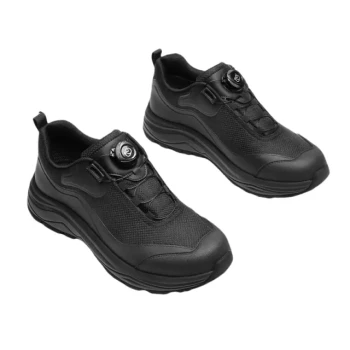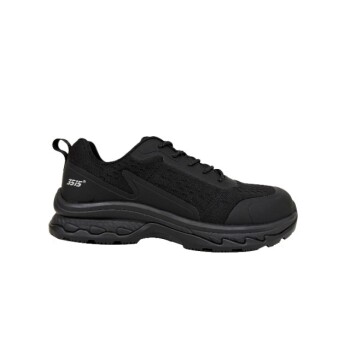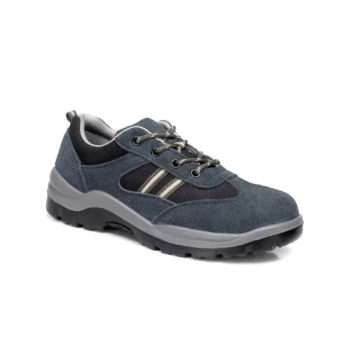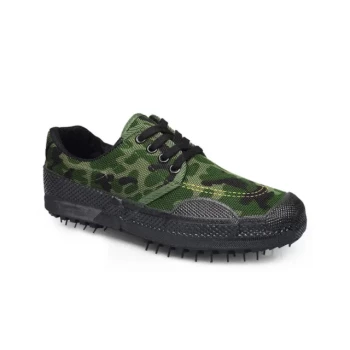At its core, the primary benefit of rubber as a work shoe upper is its exceptional ability to provide a waterproof, flexible, and durable barrier. It excels in environments where protection from liquids and physical mobility are more critical than breathability or a formal appearance.
Rubber work shoes offer an unparalleled solution for wet and demanding physical jobs. Their main advantages—water resistance and flexibility—are a direct trade-off for their primary limitation: a complete lack of breathability.
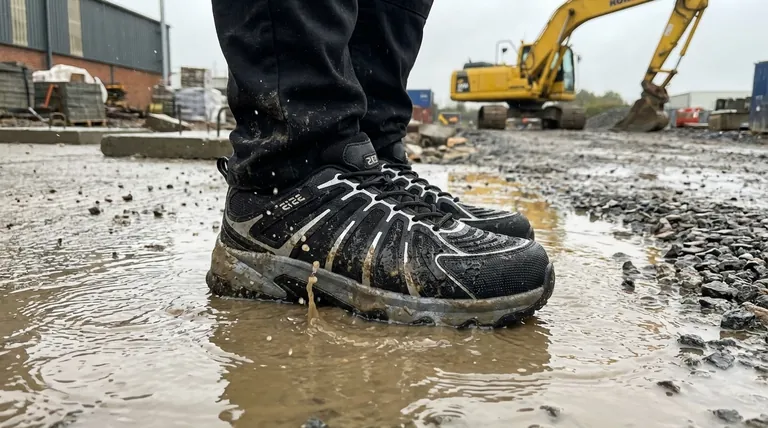
The Core Advantages of Rubber Uppers
Rubber is a specialized material chosen for very specific performance characteristics. When it's the right material for the job, it often has no substitute.
Unmatched Water and Liquid Resistance
The most significant benefit of a rubber upper is its non-porous nature. It creates an impermeable shield against water, mud, chemicals, and other liquids.
This makes rubber the definitive choice for industries like agriculture, food processing, sanitation, and construction, where feet are constantly exposed to moisture.
Superior Flexibility for Active Work
Rubber is inherently soft and flexible, allowing for a natural range of motion. This is a critical advantage for jobs that require frequent bending, kneeling, or squatting.
Unlike stiffer materials, rubber moves with you, reducing strain and improving comfort during physically demanding tasks that involve prolonged walking or standing.
Excellent Durability and Abrasion Resistance
Rubber is a tough material that stands up well to scuffs, scrapes, and general wear. Its inherent resistance to abrasion means the upper won't easily break down when faced with rough surfaces.
This durability ensures a longer service life for the footwear, even in harsh working conditions.
Typically Lightweight Construction
Modern rubber compounds allow for the construction of work shoes that are surprisingly lightweight. This reduces foot fatigue over long shifts, making it easier for workers to stay on their feet.
Understanding the Trade-offs
No material is perfect for every situation. The very properties that make rubber excellent for wet work create distinct disadvantages in other contexts.
Lack of Breathability
The same non-porous quality that makes rubber waterproof also means it is not breathable. Air cannot circulate, and moisture from sweat cannot escape.
This can lead to overheating and discomfort, particularly in warm climates or during strenuous activity, making them a poor choice for hot, dry environments.
A Less Customizable Fit
Rubber does not "break in" or conform to the unique shape of your foot over time in the way that leather does. The fit you get out of the box is the fit you will always have.
This can lead to comfort issues for some individuals, as the boot cannot adapt to provide a more personalized fit.
Limited Application and Style
Rubber work shoes are purely functional. Their appearance is informal and purpose-built, making them entirely unsuitable for office settings or any role that requires a professional dress code.
Making the Right Choice for Your Job
Selecting footwear with a rubber upper is a decision based on prioritizing specific protections for your work environment.
- If your primary focus is working in wet, muddy, or chemical-exposed conditions: Rubber is the non-negotiable, superior choice for keeping your feet dry and protected.
- If your primary focus is mobility and all-day comfort for a physical job: The flexibility and light weight of modern rubber shoes make them an excellent option, especially if your tasks involve bending and walking.
- If your primary focus is working in a hot, dry climate or a professional setting: You should look to other materials like leather or synthetics that offer better breathability and a more formal appearance.
Ultimately, choosing rubber is about prioritizing waterproof protection and functional flexibility for demanding environments.
Summary Table:
| Advantage | Key Benefit | Ideal For |
|---|---|---|
| Water & Liquid Resistance | Impermeable shield against water, mud, and chemicals | Agriculture, food processing, sanitation |
| Superior Flexibility | Natural range of motion for bending and kneeling | Construction, physically demanding tasks |
| Durability & Abrasion Resistance | Tough material that withstands scuffs and scrapes | Harsh working conditions, rough surfaces |
| Lightweight Construction | Reduces foot fatigue during long shifts | Jobs requiring prolonged standing or walking |
Need durable, waterproof work shoes for your team?
As a large-scale manufacturer, 3515 produces a comprehensive range of high-performance footwear for distributors, brand owners, and bulk clients. Our expertise in rubber compounds ensures your workforce gets the superior protection, flexibility, and durability they need for the most demanding jobs.
Contact us today to discuss your specific requirements and get a quote!
Visual Guide
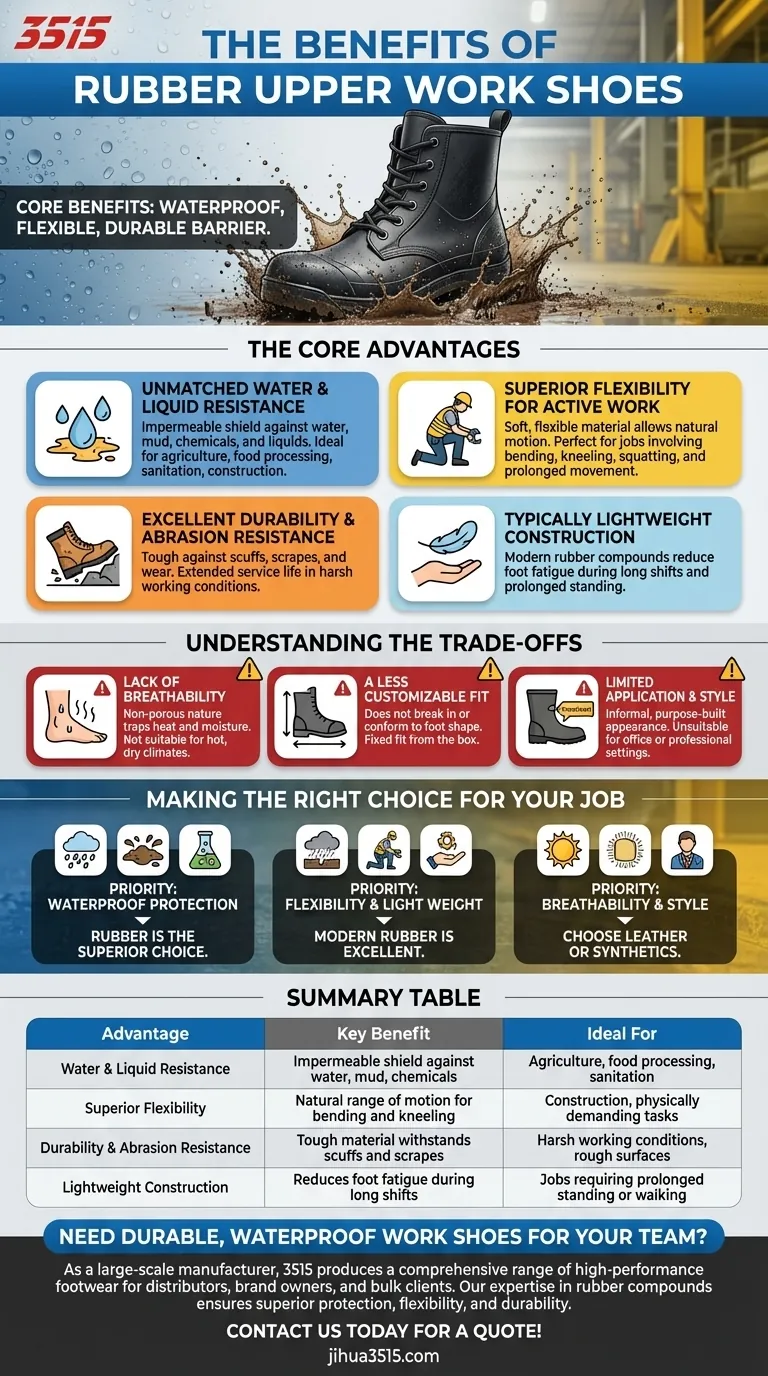
Related Products
- Premium KPU Athletic Safety Shoes for Wholesale
- Durable Rubber-Soled Utility Shoes for Wholesale & Custom Brand Manufacturing
- Lightweight Breathable Training Shoes for Wholesale & Custom OEM Manufacturing
- Wholesale Breathable & Cushioned Training Shoes Custom Factory Production
- Wholesale Breathable Training Shoes Custom Athletic Footwear Manufacturer
People Also Ask
- What are the general OSHA requirements for safety footwear? Ensuring Compliance and Worker Safety
- How are physical ergonomics research findings applied to protective products? Engineering High-Performance Safety Gear
- How does S3 protection differ from S2? Matching Safety Footwear to Your Work Hazards
- What are the key features of proper work shoes for standing? Essential Guide for All-Day Comfort & Safety
- What core protection functions do industrial-grade Safety Shoes provide during drilling and blasting in a quarry?
- What is the most comfortable safety shoe? Find the Perfect Fit for All-Day Comfort
- What standards must safety footwear meet? Ensure OSHA & EN ISO Compliance
- What are the different safety classes under the EN ISO 20345 standard? A Guide to S1, S2, S3, S4, S5
